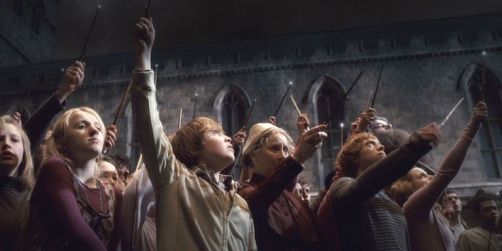
I taught Language Arts at Hogwarts Academy for 26 years. I’m not in any of the movies about Harry Potter, but that’s because in scenes with the faculty I’m usually 6-9 inches out of the camera’s view. When I watch the films, once in a while I’ll see the back of my head with my bald spot: there I am!
One of the main reasons why I’m not in the movies is simply because nothing exciting happened in my Language Arts classes. I was pretty upfront with my students on the first day.
They would ask: “You’re a storyteller, right? We get to read the great stories of wizards, right?”
“No,” I’d say. “Just the rules of language. And spelling.”
I would stride into the class like I was being chased by Dementors (a trick I learned from my bridge partner, Professor Snape) and pull out my wand. I declared, “Extemporaneous!”
The older kids would, quickly, scan their spell books for this command; it wasn’t there. They’d ask me what’s the power behind this new wand command.
I’d tell them, “There will be no spells in my class, no poems, and no quick magic. I want you to use your brains and tell me what you’re thinking. That is my only wand command.”
Yeah, I was probably the least popular teacher at Hogwarts.
Harry Potter, by now, has probably forgotten my name. I had him for his first three years. The boy was convinced that the world was going to end unless he saved it, so he did very poorly at spelling tests. His penmanship was awful, his essays were always late, and he never knew the difference between “their” and “there”.
I told him grammar mattered and I knew he didn’t believe it. (To be fair, his best friend Hermoine was in a coma because of some spell.)
For a few years, I also taught PE at Hogwarts, which was really hard. All of the PE students were kids who didn’t make it into the Quidditch team and were often so uncoordinated that they couldn’t stay on a flying broom for more than five minutes.
For those who couldn’t fly in the air, there was flag football.
Playing flag football at Hogwarts was always depressing. First of all, it was next to the Quidditch fields so other kids would be flying around, doing mythic moves and historic plays while we were running around in polyester shorts and shirts, shuffling around the field trying to pull each other’s flags.
I had two rules: 1) No magic while playing flag football. 2) You have to run at least three times during a period.
Most of my PE kids just formed a line – quite slowly – and then shuffled towards each other. At the end of my time, we lost the football and continue to play: no one noticed.
When you watch the movies and they show the Quidditch tournaments, everyone is into the game. They’re cheering, casting spells, and rooting for the team. If only the camera could do a wider shot it would reveal a group of slumping students, working on their homework, and facing in every direction except the Quidditch game.

Yeah, those were my PE classes.
I liked Dumbledore and I think he liked me. He once asked me to proofread one of his convocation speeches. Half the sentences were grammatical impossibilities and the other half read like someone talking in their sleep. I made the corrections and sent it back to him.
“My,” the Grand Wizard said. “That’s a lot of red ink!”

“Sorry,” I said with a shrug. “That’s just me, practicing my magic.”
He laughed at this. His laughter was something I always kept with me. Whenever I ate my lunch alone or struggled with the bored looks on my students’ faces, I heard Dumbledore’s laugh and it kept me going.
When there were nasty words written in blood on the halls of Hogwarts, I mentioned that there were a couple of dangling participles in the warning. My comment didn’t make it into the film. Dumbledore turned to me and looked at me above his glasses. “Talk to me in the morning. That might be the clue we need,” he said.

Turns out, it wasn’t. By the time I met with Dumbledore, Harry had already made his way to the Chamber of Secrets and fought a dragon and saved the world. However, it was my idea, once everything was cleaned from the Chamber, to turn it into storage for our Christmas decorations. That recommendation also didn’t make it into the movies.
When Umbridge took over, she left me alone. I was the only teacher who didn’t get a visit from her in my class. She was a bully and nasty and horrible, but she paid me the greatest disrespect by ignoring me completely. In fact, I don’t think she knew I was on the faculty.
Dumbledore returned and his final year was spent visiting my class often. I’m not sure why, but his presence became less of a supervisor and more of a friend.
At his departure, the school raised their wands in honour of him. I didn’t have my wand; instead, a laser pointer. It worked. It also was Dumbledore’s favourite gizmo of mine.
“Yeah, the batteries last forever,” I said to him one day when he was admiring it.
“Eternal batteries?” he asked in wonder.

“Not really. They’re just well built, small, and last a long time. Hard to find, though.”
He laughed and I heard his laughter when I raised my laser pointer on that cold night at Hogwarts.

I love to garden and I grow food.
One day, when things were getting really bad at Hogwarts, a group of students visited me and asked why I didn’t use any magic to grow my plants. “It would be faster than all the work you’re doing,” a little girl said.
“I know,” I said. “But that would be missing the point. Most good things in the world take time, take work. Sure, a bit of magic is great and wonderful. And yet, to live off of that would miss labour, mistakes, and working with things and people. When you work at something and with someone, there’s more of a chance to love what you do and who you’re with. And isn’t love the greatest form of magic?”

“Who said that?” one of the students asked.
“Dumbledore,” I answered. “And magic isn’t just in the instantaneous or the dramatic, but the everyday things of our world.”
“Did Dumbledore say that?”
“No, I think Wordsworth did,” I said.
“Is he a wizard?”
“No, he was in last week’s reading.” They left me to work in my garden and that year, I grew hundreds of carrots. I shared them and everyone asked me what kinds of spells I used to grow them. “I cast the spell ‘Extemporaneous’.”
When Voldemort had his showdown against the school, I wasn’t there. Instead, there was a gas leak in the school’s basement I had to get to. It was absolutely scary: the whole building could have been flooded with gas.
I repaired the pipes and fixed everything right about the time someone found me and told me the story. I was glad that Neville got to play a part in saving the world, I was proud of Harry, and glad that the baddies didn’t win.
It took several months to clear the rubble of Hogwarts and get it rebuilt. Many of the builders didn’t use magic, at least when I was working with them. For some things, there wasn’t any other way: we had to raise our wands and cast a spell. But for most everything, we wanted the school to be rebuilt by love and that’s how we worked. If Hogwarts went up again, magically, the next day, I don’t think we would have loved it as much.
No, we wanted to use the strongest magic we knew: love.
I came back to teach one last year before I retired. I began my class without a wand, but a laser pointer. I commanded: “Extemporaneous!” No one laughed. Instead, they searched their books for the spell. Somewhere in the halls where they hang their portraits, I heard Dumbledore’s ghost chuckle.







